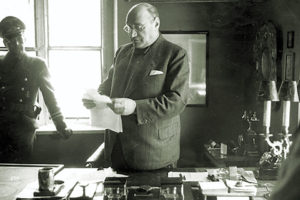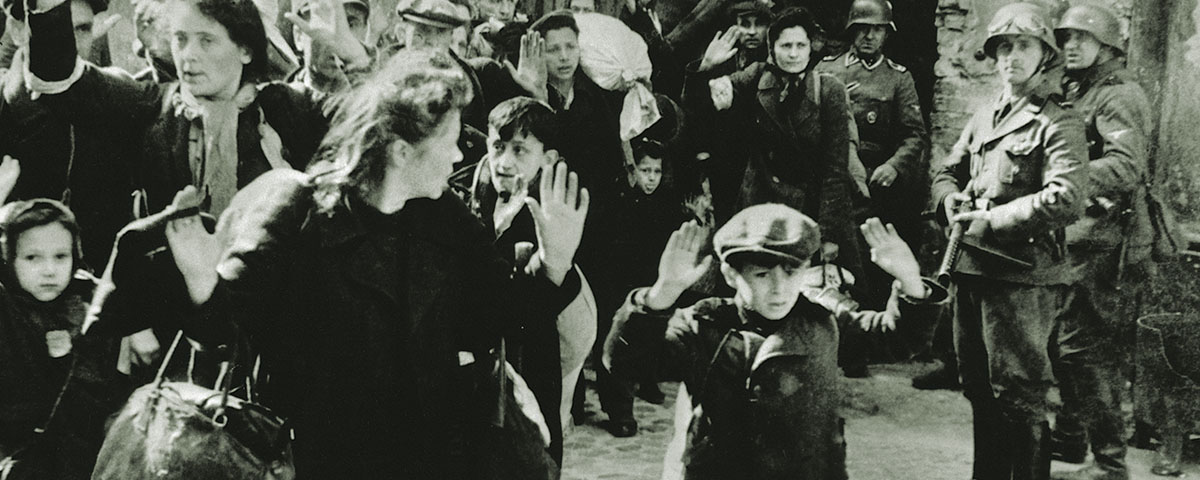In 1939 Poland’s Nazi occupiers made Adam Czerniaków the leader of the Jews in Warsaw. Three years later he would reach the breaking point.
In 1939, even before Germany had completed its conquest of Poland, the Nazis began herding most of the country’s 3.3 million Jews into marked-off urban ghettos. The German occupational authorities created Judenräte (Jewish councils) made up of Jewish community leaders who, in many cases, were involuntarily appointed. Their function was defined by Reinhard Heydrich, Heinrich Himmler’s deputy and one of the chief architects of the Holocaust, who decreed that the Judenräte were to “bear the full responsibility for executing exactly and according to a time schedule, every order given at present or in the future.” What those orders would be, and the catastrophe that was about to befall Poland’s Jews, was left unstated.

In Warsaw the German occupational authorities appointed Adam Czerniaków, a prominent engineer and senator, to head the 24-member Judenrat there. “I now find myself in a post which I did not assume on my own initiative and of which I cannot divest myself,” Czerniaków wrote in his diary. “I am not independent and I do only what is possible.” He quickly learned that under Nazi rule very little was possible, especially once the Germans began crowding nearly a third of Warsaw’s population into a Jewish ghetto that was packed into less than 3 percent of the city’s living space.
Once the Jews were sequestered in the ghetto, the Germans began sealing it off from the outside world. “The Jews must adjust themselves to all conditions,” the top Nazi official in Warsaw said, “but we shall endeavor to create such conditions for them that will make the adjustment difficult.” In July 1942, having separated Poland’s Jews from their neighbors, the Germans began deporting and exterminating them en masse.
The Nazis’ decision to use the Judenräte as a tool to facilitate their program of first controlling and then eliminating the Jewish population was a policy of cynical cruelty. “To follow one line of thought,” the Jewish philosopher Emil Fackenheim has noted, “if one could not make Jews destroy themselves one could, perhaps, make them destroy each other. By making some Jews rule over others one could achieve this aim equally….Base Jewish rulers would destroy the Jews ruled by them, so as to save themselves. Noble Jews would sacrifice some Jews they ruled so as to save others. Neither…of course, would himself be spared.”
This was the situation in which Czerniaków found himself. He could not protect all his people; ultimately, he could not protect any of them any more than he could protect himself. It is clear from his diary, however, that in the beginning he hoped he might.
Was Czerniaków incredibly naive to have harbored any optimism at all? Perhaps, but at the beginning of the war the true nature of the Nazi agenda was not immediately apparent to those who were its intended victims, and the ultimate scale of the impending genocide was certainly not discernible. “The 24 leaders of the Warsaw Judenrat could not have been aware of what would be demanded of them,” Israel Gutman, a Polish-born Israeli historian who survived the Holocaust, writes. “Jews who accepted these roles, or were forced to do so, could not fully understand the Nazi regime’s intentions….Centuries of experience had taught them that if the Jewish representatives could not influence hostile rulers, they nonetheless could intercede and request mercy in high places….And this was certainly not the first time in the history of Jews in the Diaspora when Jewish leaders would be forced to serve their community on behalf of a hated and oppressive ruler.” Thus the Judenräte trusted a historical model that was obsolete in the face of the new threat that confronted them. Czerniaków’s decisions might at first glance seem to have been delusional, but they were predicated on a historical view that allowed for some degree of rational hope. Tragically, this was a fatally mistaken perception.
Today we know that the deportation transports from Warsaw led to the gas chambers of Treblinka and other abattoirs, but in 1941 and much of 1942 the men and women of the various Judenräte did not yet know it. In the absence of that knowledge they attempted to live under the occupiers’ rule, even as their ultimate destruction was being plotted. The slow reaction of Warsaw’s Jews to the threat confronting them was not a matter of sheep-like pacifism or a lack of intelligent foresight. The Nazi plan of genocide was unparalleled in modern history, and the Germans were careful, at least in the beginning, to disguise the ultimate purpose of the deportations.
Czerniaków’s problem, then, was to try to maintain his heading in a rapidly shifting landscape of threat, danger, and pressure. The lethal threat obviously came from the Nazi occupiers, but he faced almost constant pressure from inside the ghetto as well. Near starvation, outbreaks of typhoid and other diseases, extortionate taxes levied for nearly every service the ghetto needed, the ever-present fear of what would happen next—all exerted incredible strain on the social fabric of a community in peril. Czerniaków had the moral responsibility of leading that community, and he did so at a considerable cost to himself. In his diary entry for November 4, 1940, he recounted his visit to the German occupational offices to deliver a petition. “When I appeared at the Battalion office, the officer in charge set upon me, hitting me on the head till I fell,” he wrote. “At this point the soldiers started kicking me with their boots.” The soldiers threw him down the stairs and beat him nearly senseless.
When rumors began to circulate in early 1942 that announcements of “resettlement to the East” in fact meant transport to extermination camps, Czerniaków asked the Nazi authorities whether there was any truth in them. The officials repeatedly assured him that the rumors were baseless. But all the while, the Nazis were setting in motion the machinery to exterminate an entire people. In June the Germans initiated Operation Reinhard, the secret plan to eradicate the populations of Jewish ghettos across Poland. Three death camps were established in Belzec, Sobibór, and Treblinka specifically to carry out this directive. By mid-July, the inhabitants of the Warsaw Ghetto saw clear signs that a mass deportation was looming.
Czerniaków desperately kept trying to find out what was happening. On July 20 he once again asked Gestapo officials as to the truth of the rumors. He was told, he wrote in his diary, “that all the talk was utter nonsense.”
Two days later the deportations began. Over the next eight weeks approximately 254,000 residents of the ghetto were sent to the Treblinka extermination camp. “Sturmbannführer [Hermann] Höfle and associates came at 10 o’clock,” Czerniaków wrote. “We were told that all Jews irrespective of sex and age, with certain exceptions, will be deported to the East. By 4 p.m. today a contingent of 6,000 people must be provided. And this at the minimum will be the daily quota.” The Germans added a new, personal threat to this order. “Sturmbannführer Höfle…informed me that for the time being my wife was free,” Czerniaków wrote, “but if the deportation were impeded in any way, she would be the first one to be shot.”
For nearly three years Czerniaków had struggled to hold his community together in the face of mounting danger, enduring repeated humiliations and physical abuse from the Germans because of his efforts to gain reprieves for Jews rounded up for deportation or execution. Still, he tried to limit the scope of the new deportation order. On July 23, when he was ordered to have 9,000 people assemble to board the transports to Treblinka, he pleaded that orphans and children be exempted. The Germans refused.
Czerniaków went back to his office and wrote two letters, one to his wife and the other to the members of the Warsaw Judenrat. “They are demanding that I kill the children of my people with my own hands,” he wrote. “There is nothing for me to do but die.” He then swallowed a potassium cyanide tablet and died at his desk, choosing to take his own life rather than become complicit in the mass murder of his community’s children.
After the war some commentators would accuse Czerniaków and other leaders of the various Judenräte of being “Judas goats” who led their people to slaughter, thus aiding and abetting the Nazis’ program of genocide. If this had been true, it would certainly have been collaboration of the worst kind. In Czerniaków’s case, however, it was not.
Indeed, a strong argument that Czerniaków was not a collaborator or a knowing participant in the mass murder of his people comes from Jürgen Stroop, the SS commander who led the suppression of the Warsaw Ghetto Uprising in 1943. Tried as a war criminal in Poland after the war, Stroop testified that Czerniaków “could not have known about the gas chambers at Treblinka, for they were put into operation only on the day of his death.” The situation that confronted Czerniaków in Warsaw in 1942 had no precedent, so it is not surprising that he could not envision the horrific realities of the Final Solution. (Before the war ended, more than 700,000 of Poland’s Jews would be murdered in Treblinka.) For Czerniaków, the unbearable blow came when he realized that he could not save even the most vulnerable of his community.
Czerniaków was a decent man who chose to die by his own hand when confronted by an unbearable ethical dilemma. For all his detractors, “he was never a blind executor of the German orders,” historians Joseph Lichten and Ludwik Krzyzanowski have noted, “though he often had to yield in order to serve a greater good.” Nor was he a petty despot like Mordecai Chaim Rumkowski, the president of the Judenrat in the Lodz ghetto, who, when presented with the same orders as Czerniaków, demanded that Jewish parents surrender their children for deportation so that others of the community might be spared.
Perhaps the sharpest criticism that can be leveled against Czerniaków is that he was, as Gutman has written, “perhaps too decent for a time that required much more than decency and morality to lead the Jewish people.” A decent and moral man may not have been able to comprehend that within three years, only 380,000 Polish Jews, out of more than three million, would remain alive. Czerniaków was not a traitor to his people, nor was he an accomplice in their destruction. MHQ
John A. Haymond is the author of The American Soldier, 1866–1916: The Enlisted Man and the Transformation of the American Army (McFarland, 2018).
[hr]
This article appears in the Autumn 2018 issue (Vol. 31, No. 1) of MHQ—The Quarterly Journal of Military History with the headline: Unwilling Accomplice





